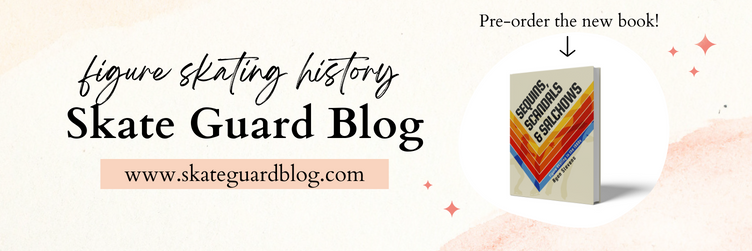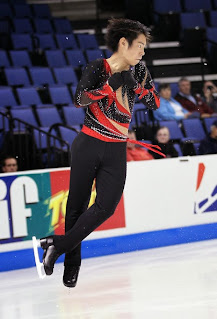Usually when skaters transition from competing for one country to another, they do it to gain some sort of advantage. Daisuke Murakami is one skater who really did quite the opposite. The depth in Japanese skating (particularly among the men) is unreal right now and he is one of about 5 or 6 skaters all fiercely competing for a chance to represent their country at this year's Four Continents Championships, Winter Olympics and World Championships. Starting his skating career in the U.S. after his family moved there in 2000, Murakami competed internationally as an American at the World Junior Championships and on the Junior Grand Prix. He has since made 4 trips to the Japanese Nationals and represented Japan on the Senior Grand Prix and at several other international events. After an injury forced him to end his season quite early last year, Murakami is already off to a dazzling start this year, winning both his Regionals and Sectionals in Japan and ensuring him another trip to Nationals this season where he hopes to best the rest. Daisuke, a student of iconic coach Frank Carroll, took the time to talk at length about his competitive career, training regimen, comeback from injury and much more:
Q: You started your career competing for the U.S. and even represented America at the 2006 World Junior Championships in Ljubljana, Slovenia. After missing the U.S. team for the 2007 event, you were released to compete for Japan. What sparked the decision to change countries and why do you feel it has been the best decision for you and your career?
A: The U.S. Federation gave me a great opportunity to compete for the U.S. which I am thankful for to start off my skating career on the international circuit. The reason I made the decision to switch to represent Japan is because I was born and raised there and I felt it was the only way I would feel at home. I am humble to skate for my country. I would say the biggest influence that helped me make this decision would be Kyoko Asada. My parents were very close with Kyoko and they helped me find the answer I needed.
Q: You've had some wonderful success internationally, winning international events like the Ondrej Nepela Memorial and Merano Cup and having some strong results in senior Grand Prix events as well. How do you deal with the pressure of competition and keep your nerves in check?
A: The team I work with would be the biggest factor of being mentally prepared. Before, I would train for myself without the right guidance I needed as I prepared for competitions during the season. Now, I feel trained before competitions which helps my nerves to be more at ease.
Q: What do you feel is your biggest strength as a skater? Your biggest weakness?
A: My biggest strength would be pushing my work ethic on the ice everyday and not missing a day of training that would be wasted. My weakest point is putting pressure on myself and trying to stay consistent throughout the whole season which is still a learning experience for me.
Q: Frank Carroll, Lori Nichol, Nikolai Morozov... you have worked with some of the sport's living legends. What has each of these talented coaches and choreographers brought to your skating from a development standpoint?
A: I have had many opportunities to train under coaches who have helped me in every way. Nikolai Morozov was the first to put me on the senior circuit internationally and he provided the most intense training regiment - not only jumps but steps and spins that I was never able to do as a Junior. He helped me utilize my whole body to skate more freely with my arms and legs which I was never able to do. Lori Nichol was recommended by Frank Carroll. I have always praised her for her work. I understand now why she is the best at what she does with her creativity, work and her understanding of the new judging system that sets her apart for her skaters. Her programs that she's created led me to some of my first international wins. I am on my third season working with Mr. Carroll and he has the greatest input on the way I should be training. He has helped me realize that I need to be running programs every single day from start to finish and won't tolerate stopping no matter what you are doing in a runthrough practice which also has helped my mental mind to become stronger. Along with Mr. Carroll, I split my training time with Angela Nikodinov as she currently travels with me to my competitions. We have the best connection and understand each other very well. She strives for the best, to get the best out of her skaters.
Q: What is your favourite food and your favourite jump?
A: My Favorite food would be Korean BBQ. It's the one thing my teammates and I look forward to after every competition, especially in Japan. My favorite jump would be the triple axel because of the time and effort I spent to get it consistent to where it is today.
Q: You're fresh off wins at both the Tokyo Regionals and Western Sectionals in Japan and have qualified with ease for this year's Nationals, which must be particularly sweet after coming off a shoulder injury last season. What are your ultimate goals for this season and what do you think it will take to beat skaters like Daisuke Takahashi, Nobunari Oda, Tatsuki Machida, Yuzuru Hanyu, Takahiko Kozuka and Takahito Mura?
A: I was written off after my withdrawal from NHK and Japanese Nationals last year. My mindset this year was to strengthen and condition my body and start from the ground up starting with Regionals. Because I was held back physically compared to my competitors in Japan, I plan to take every competition this year and build within every competition and give my best performance at Japanese Nationals.
Q: Who are your three favourite skaters of all time and why?
A: Only 3?! Evgeni Plushenko, because I started skating watching him compete and trying to learn his perfected jump techniques. Daisuke Takahashi, because of his artistry. What he brings to figure skating every year is phenomenal. Michelle Kwan, because she was the first elite skater I got an opportunity to train with and her dedication she gave to this sport is beyond words.
Q: You've traveled the world and the seven seas. What's one place in the world you'd most like to visit that you haven't yet?
A: Thailand. My very close friend is born and raised there and I have always heard from the family that it is the one place I should vacation one day. I would love to ride some elephants and experience the Thai culture.
Q: Men's skating has really been so much about the quad in the last 10-20 years, now moreso than ever. Do you think there should be a limit to the number of quad and triple jumps skaters include in their programs or is the TES score being evaluated in the right way right now?
A: I'm just glad we as skaters are credited for a quad attempt.
Q: What's one thing about you most people don't know?
A: I have finished university with a degree in business. Also, I have a pug puppy named Benji. He's turning 1 next week.
Q: What's the most heartwarming thing a fan has ever done for you or said to you?
A: I have numerous fans that follow me to every competition and that is the biggest gift - to experience all my competitions along with them. I thank them.
Skate Guard is a blog dedicated to preserving the rich, colourful and fascinating history of figure skating. Over ten years, the blog has featured over a thousand free articles covering all aspects of the sport's history, as well as four compelling in-depth features. To read the latest articles, follow the blog on Facebook, Twitter, Pinterest and YouTube. If you enjoy Skate Guard, please show your support for this archive by ordering a copy of the figure skating reference books "The Almanac of Canadian Figure Skating", "Technical Merit: A History of Figure Skating Jumps" and "A Bibliography of Figure Skating": https://skateguard1.blogspot.com/p/buy-book.html.


